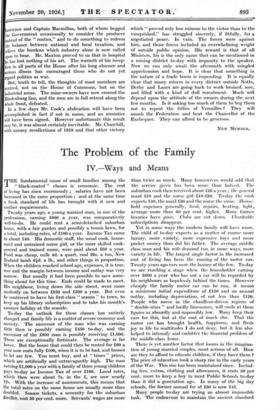The Week in Parliament
THE House of Commons, since its _reassembly last week, has been unexpectedly and devastatingly dull. The Electricity Bill is finished with at long last, and it will not be our fault if we hear of it again. Respan7 sibility now weighs heavily upon the House of Lords. If they compel a recalcitrant and _exhausted Lower House not only to peruse once more the endless series of wholly unintelligible clauses embodied in this Bill, but a. further series of equally unintelligible amendments and, worst of all, to listen again to Sir, Joseph Nall and Mr. George Balfour, their chances of obtaining increased powers in the lifetime of the present Parliament will be remote. _ It is impossible not. to admire the determination with which the halklozen fanatical opponents of the electricity scheme have talked during , the last six months. For sheer purposeless obstruction their performance is probably unexampled since the War, but it is none the leis admirable for that. At a time when the art of Parliamentary opposition has sunk to an almost unbe- lievably low level, it is comforting to know that in competent hands it can still be practised - with effect. It was a bad' tactical, error to accuse Sir Dmiglas Hogg of discourtesy, because, when roused, he .gives mere' than he gets, and did so last Friday, to the obvious discoro fiture of the " die-hards." C,olonel Meore-Brabazon emerges from a severe Parliamentary test with a high reputation enhanced.
The Broadcasting debate, which had been well &Iva:. • .• tised, produced nothing of interest or amusement, but the discussion on the relief of unemployment produced one or two speeches of value, notably those of Miss Susan wrence and Captain Macmillan, both of whom begged the Government occasionally to consider the producer instead of the " rentier," and to do something to redress the balance between national and local taxation, and relieve the burdens which industry alone is now called upon to bear. Mr. Maxton proved to us that in hospital he has lost nothing of 'his art. The warmth of his recep, ion in all parts of the House after his long absence and serious illness has encouraged those who do not yet mad politics as war. Lot, -truth to tell, the thoughts of most members are centred, not on the House of Commons, but on the industrial areas. The mine-owners have now crossed the Hindenburg line, and the men are in full retreat along the whole front, defeated.
In a few days Mr. Cook's abdication will have been accomplished in fact if not in name, and an armistice will have been signed. However unfortunate this result may be, it was almost certainly inevitable. Mr. Churchill, with uneasy recollections of 1918 and that other victory which " proved only less ruinous to the victor than to the vanquished," has struggled sincerely, if fitfully, for a negotiated peace. In vain. The forces were against him, and those forces included an overwhelming weight of outside public opinion. His reward is that of all Ministers, his is the only name that can be mentioned in a mining district to-day with impunity to the speaker. Now we can only await the aftermath with mingled apprehension and hope. It is clear that something in the nature of a trade boom is impending. It is equally clear that many miners in every district outside Notts, Derby and Lanes are going back to work bruised, sore, and filled with a kind of dull resentment. Much will depend upon the attitude of the owners during the next few months. Is it asking too much of them to beg them not to repeat the follies of Versailles ? They will smash the Federation and beat the Chancellor of the Exchequer. They can afford to be generous.
NEW MEMBER,.































































 Previous page
Previous page